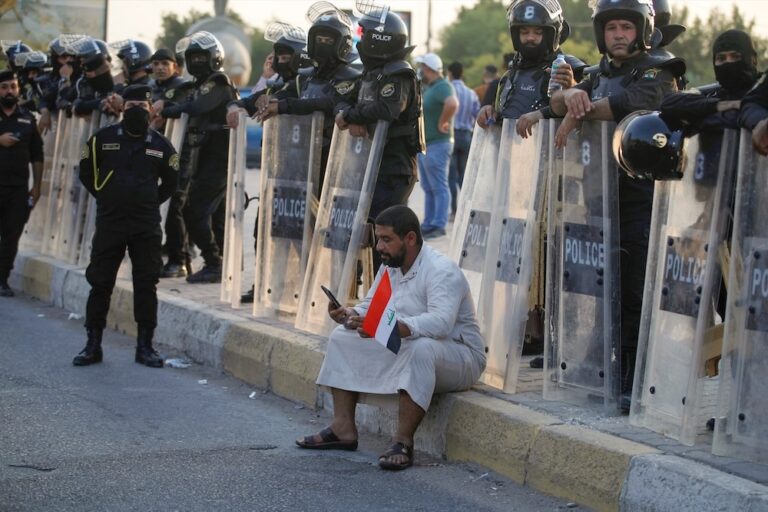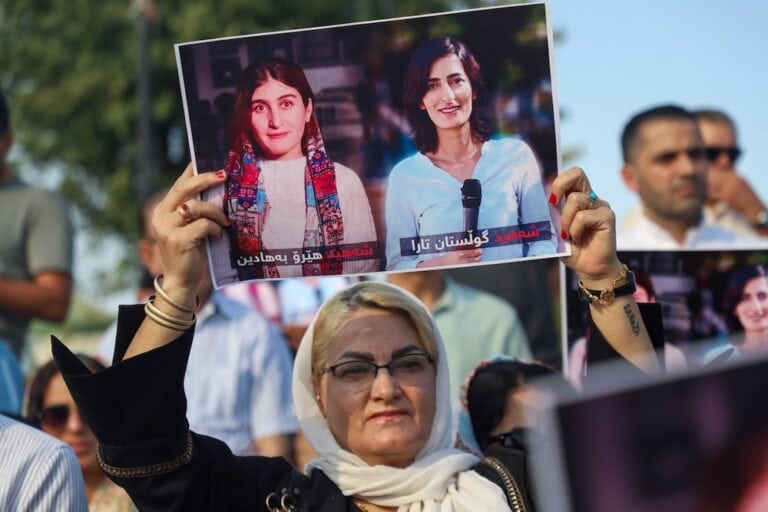While applauding the government's professed desire to encourage media diversity and respect for freedom of expression, RSF is of the view that, in its present form, the proposed law would not help achieve these goals.
(RSF/IFEX) – 11 June 2011 – Reporters Without Borders wrote on 26 May to Massoud Barzani, the president of Iraqi Kurdistan, voicing deep concern about a bill for the creation of a High Council for Information in Iraqi Kurdistan that was unveiled on 13 and 14 May in Sulaymaniyah.
President Massoud Barzani
Kurdistan Regional Government
Erbil
Paris, 26 May 2011
Dear President Barzani,
Reporters Without Borders, an international press freedom organization, would like to share with you its concern about a bill for the creation of a High Council for Information in Iraqi Kurdistan that was unveiled on 13 and 14 May in Sulaymaniyah.
Our organization hails the government’s declared desire to encourage media diversity and respect for freedom of opinion and expression, while putting the emphasis on reinforcing the principles of media ethics and professionalism.
However, we are of the view that, in its present form, the proposed law would not help to achieve these goals.
We are very worried about some parts of this bill, particularly those concerning this Council’s independence.
It is clear from its make-up that this High Council for Information could not be regarded as an independent body. According to Article IV of the bill, the Council will have nine appointed members, of whom the President of the Kurdistan Regional Government will name three for six-year terms, the Speaker of Parliament will name three for five-year terms and the Prime Minister will name three for four-year terms.
Our concerns about the Council’s lack of independence are increased by the provisions of Article V, according to which the President of the Council and its members will be sworn in by the President of the Kurdistan Regional Government. Nowhere is it specified that the persons chosen should be experts in the field of media and information. Nowhere is it said that membership of the Council is incompatible with certain positions, especially political ones. Why the terms of office of the Council’s various members are of different length is not explained. It reinforces political influence over this body, which is supposed to be independent.
We fear that this Council will be directly controlled by Kurdistan’s two main political parties, the Kurdistan Democratic Party, which you lead, and the Patriotic Union of Kurdistan, led by Jalal Talabani.
Like the appointment of its members, the way the Council is funded raises more doubts about its independence. Article III refers to the administrative and financial independence that the Council is supposed to enjoy, but it is clear from Article XIII that part of its funds will come from the region’s general budget. Other funding provisions will necessarily have to be approved by the Cabinet. The bill makes no provision for a budget, not even a minimal one.
We are also concerned about the principles underlying the creation this Council. Article VII alludes to the many fundamental principles that the Iraqi media must respect, both those based on international principles and those that are proper to the region’s characteristics. But the bill does not define these general principles, nor does it mention the sanctions that could be imposed on those who violate them.
The bill does not specify whether the Council’s responsibilities will extend solely over the broadcast media or whether they will apply to the print media and online media as well. It should be pointed out that self-regulation is preferable for the print and online media.
The wording of the Council’s goals in Article VIII is vague. No mention is made of the resources available to the Council to achieve these goals. And some of the goals seem to contradict the Council’s independent nature. Article 8 A-4, for example, says the Council will “serve the region’s media goals in all domains.”
Similarly, the bill is also completely vague about the Council’s powers and responsibilities and the procedures it uses.
The wording of the powers listed in Article IX is very imprecise. There seems to be a confusion between the Council’s goals and powers. While it says that the Council contributes “in cooperation with the competent authorities in the formulation of information policy” (IX-A) and helps “draft professional conduct codes in cooperation with the competent authorities” (IX-C), there is nothing in the bill about the tools available to the Council for fulfilling these goals. We are not told whether the Council recommends or advises, or whether it has the power to impose sanctions.
Subsections H and I of this article say the Council will have the power to examine complaints that are submitted to it, and to “reconcile the parties involved in conflicts over media issues,” but they cast doubt on its role and purpose. It is meant to mediate, arbitrate or have the powers of a court ? There is also no mention of mechanisms for appealing against its decisions.
Reporters Without Borders believes that, as it stands, this bill repeatedly opposes the cause of media pluralism, the cause we defend. Such a council would violate the principle of media freedom because the imprecise wording of this proposed law could be used to control and punish journalists and news media. We therefore urge you to refrain from creating the Council as defined in this bill.
We stand ready to discuss our observations and continue the debate on this subject with you,
Respectfully,
Jean-François Julliard,
Reporters Without Borders secretary-general


